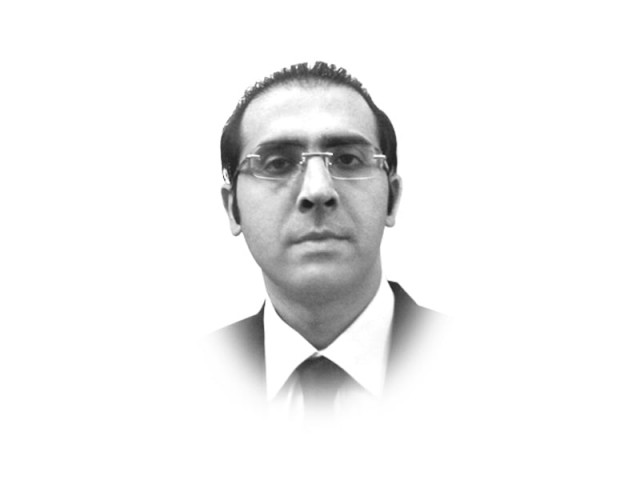Beyond the Law
Supreme Court is no longer just a court of law; it's a court of Justice, a modern day incarnation of Solomonic ideal.

The writer is a lawyer and partner at Ijaz and Ijaz Co in Lahore
saroop.ijaz@ tribune.com.pk
Placing this alongside the memo case, where an American national’s statement forms the core of the case, and apparently, a Canadian Pakistani’s letter has been incorporated in the petition, and one can come to the obvious conclusion of dual standards. Further placement of this with My Lord’s insistence and concern on expediting the process of voting for overseas Pakistanis makes this even more problematic. Yet to be fair to My Lords, there are no dual standards, there are no standards. Keeping in view the larger than life persona of My Lord, the response to those pedantically pointing out contradictions should be the words of Walt Whitman. “Do I contradict myself? Very well then, then I contradict myself, I am large, I contain multitudes.” My Lord the Chief Justice and the Supreme Court having conquered the ultimate frontiers of the law have come to the point where mere reference to law does not satisfy. They have perhaps, evolved or grown out of the narrow, restricting confines of the law. There has to be more. Also, debates on formal legal points do not make for good breaking news television. The completely hypothetical, uncharitable and cynical observer might think that the remarks in Court and even parts of judgments are consciously or subconsciously designed to make for good sound bites and punch lines. Dismissing Dr Qadri’s petition on standing (locus standing), timing and bonafides would have been quick, yet it would not have fed our need for drama. The fact that millions of overseas Pakistanis sending billions of dollars of remittances probably would have been unnerved is ancillary to this desire, it seems. What is a bit of xenophobia, if it makes for punchy television tickers, right?
It is difficult to pinpoint the precise moment when My Lords transcended from mere jurists to the great, timeless, moral and political philosophers. Yet, the earliest clear indications were in the NRO judgment. The question before the Court was an important, yet not particularly exciting one; namely, if the NRO was a valid piece of legislation or not. The proceedings and the judgment were nothing if not exciting. The evidence considered was derived from assorted sources, from the caliphate of Hazrat Umar (RA) to the Holy Quran, from The Way of the World by Ron Suskind to the designs of the CIA. The (290-page) judgment is a captivating read. One of my Lords narrates the history of the subcontinent from the time of Aurangzeb to the present, reproducing a speech made by Lord Macaulay on the floor of the British Parliament in 1835, and then there are excerpts from the Shahab Nama, Sheikh Saadi, Rumi’s Masnavi. There has been no looking back; the reference to law gradually began to thin, while Hafiz, Rumi and Khayyam took the centre stage. It was in relation to the same case (the implementation proceeding) that one of My Lords penned the masterpiece “Pity the Nation” and a prime minister was sent packing.
One is reminded of this for another recent reason; the Swiss authorities have refused to open the case against the president, for reasons of immunity. The brazenness of this act is disturbing. Do the Swiss not know that one prime minister has been sent home, the other summoned to court, the entire apparatus of the state practically halted for three years, the nation has been pitied, etc? Those who pointed out that the president has immunity were said to be evil, on the government’s payroll. We wait with bated breath for an expose by one of our investigative journalists to reveal that the Swiss attorney general is really a federal government (Pakistani) apologist; probably his degree is fake, etc. The hypothetical cynic might ask if it was necessary to go on with this for so long, particularly when sovereign immunity is not a contentious legal point — if ego and the need to be in the headlines had some play here. The cynic might even go so far to say if an apology is in order for wastage of time, resources and exclusion of other cases. Perish the thought; pay no heed to the conspiracy mongers.
My Lords have assumed the role of the great moral tutor of our times. A lesser man might not have taken suo-motu cognisance of the conspiracy against Master Arsalan and initiated the proceedings by himself sitting in the first hearing. Statutes, legal codes and codes of conduct are generic and for ordinary mortals. The Supreme Court is no longer just an ordinary court of law; it is a court of Justice, a modern day incarnation of the Solomonic ideal, almost a religious/mystical experience. Dr Qadri’s petition was not only an attempt to sabotage elections (which it was), it was also an opportunity for My Lords to define or at least ponder over questions of patriotism and loyalty to the country. Great minds, we have been told, think alike. The unity of opinion among My Lords is unprecedented in legal history. Not one major instance of dissent by one judge immediately comes to mind (the sole notable exception being the Mukhtaran Mai case). Hence, the whining that My Lords restrict themselves to the letter of the law, etc. should stop and we should just be grateful for the wisdom imparted.
Published in The Express Tribune, February 17th, 2013.













COMMENTS
Comments are moderated and generally will be posted if they are on-topic and not abusive.
For more information, please see our Comments FAQ